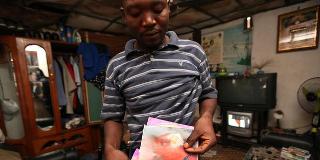Today’s court decision against the Nigerian security forces who indiscriminately opened fire on peaceful protesters in Bundu Ama almost five years ago is a victory against impunity and a triumph for justice, Amnesty International and Collaborative Media Advocacy Platform (CMAP) said.
“This remarkable victory brings to a close a long battle for justice by members of the community of Bundu Ama who were unlawfully killed and injured at the hands of Nigerian security forces,” said Netsanet Belay Amnesty International’s Africa Director.
“It sends a clear message to governments that they cannot violate people’s rights with impunity. It also demonstrates that with courage and commitment, communities - no matter how marginalised – can successfully stand up for their rights. This judgment is a testament to the courage of a community who refused to allow their human rights to be violated with impunity.”
The Community Court of Justice of the Economic Community of West African States (ECOWAS) ruled that there was no justification for the shootings. It also held that the Nigerian government had breached its obligation to protect and respect the right to peaceful association and assembly.
The court awarded a total of 11 million Nigerian Naira – nearly $70,000 USD - in damages.
On 12 October 2009 armed security forces opened fire on unarmed protesters in Bundu Ama, an informal settlement in Port Harcourt, leaving at least one person dead and 12 seriously injured. The total number of dead remains unknown because the government not only refused to undertake an inquiry into the incident but denied anything had taken place.
The case was brought by 10 residents of Bundu waterfront and surrounding communities and the Socio-Economic Rights and Accountability Project (SERAP) against the Federal and Rivers state government.
“We have come a long way and achieved a great amount,” said Joy Williams, one of the applicants who was 17 years old when she was shot in the leg during the incident.
“Our community refused to lie down and become victims but instead took action and have now beaten the government in court,” she said.
“This is an important victory in our campaign for justice but it is not the end of our struggle. The judgment of the court must now be fully implemented,” said Fubara Samuel, of CMAP.
Amnesty International and CMAP are calling on the Nigerian government to fully and effectively implement the judgment in a comprehensive and timely way and not ignore the ruling as they have done repeatedly in other cases. In December 2012 for example, the ECOWAS Court of Justice found the Nigerian government responsible for pollution caused by oil companies and ruled that it must hold the companies and other perpetrators to account. No action has yet been taken.
The case highlights a number of issues of concern to Amnesty International including the ongoing use of forced evictions and the use of excessive force by the Nigerian police and army. Amnesty International and CMAP are calling for:
· the Nigerian army and police force to end the use of excessive force and the repeal regulations which are not in line with international standards such as Police Force Order which permits police officers to shoot protesters, whether or not they pose a threat to life.
· an immediate end to mass forced evictions in Nigeria and the enactment of legal safeguards to protect people from forced eviction.
The ruling suit (No: ECW/CCJ/APP/10/10) was based on the combined provisions of Articles 1, 2, 3, 4, 5, 6, 10, 11, 12, 13, 14 and 16 of the African Charter on Human and Peoples’ Rights to which Nigeria is a signatory.
Although no forced evictions have been carried out in Bundu Ama since 2012 the threat of forced eviction still hangs over residents of the community.
Bundu Ama is one of more than 40 waterfront settlements in Port Harcourt, which make up some of the city’s most densely populated areas and are home to more than 200,000 people. Bundu Ama has not been demolished, but thousands of people have been forcibly evicted from their waterfront homes in the last four years. On 28 August 2009 up to 17,000 people were forcibly evicted from their homes in the Njemanze waterfront, when the Nigerian authorities demolished the community as part of the state authorities’ urban renewal programme for the city of Port Harcourt. On 27 June 2012, between 10,000 and 20,000 people were forcibly evicted from Abonnema Wharf.
Forced evictions are a serious human rights problem in Nigeria and the government must address this. Since 2000, more than two million people have been forcibly evicted from their homes in different parts of the country. Hundreds of thousands more continue to be at risk. Such evictions generally target marginalized people and slum dwellers, many of whom have lived for years without access to clean water, sanitation, adequate health care or education.
Article 15(4) of the ECOWAS Treaty makes the Judgment of the Court binding on Member States, including Nigeria. Also, Article 19(2) of the 1991 Protocol provides that the decisions of the Court shall be final and immediately enforceable. Furthermore, non-compliance with the judgment of the Court can be sanctioned under Article 24 of the Supplementary Protocol of the ECOWAS Court of Justice, and Article 77 of the ECOWAS Treaty.














